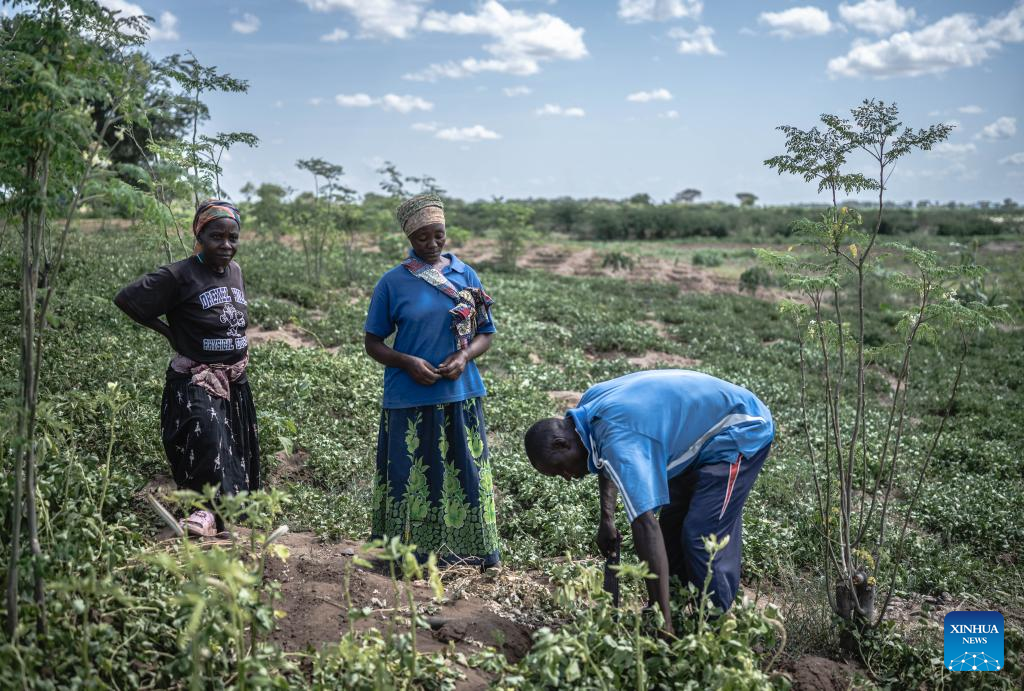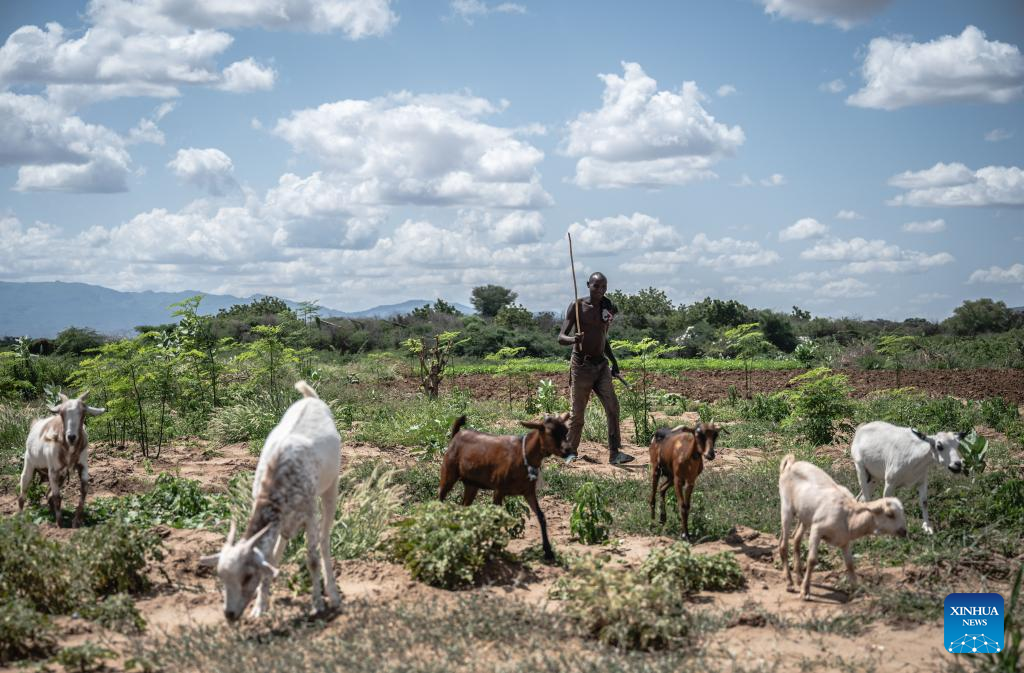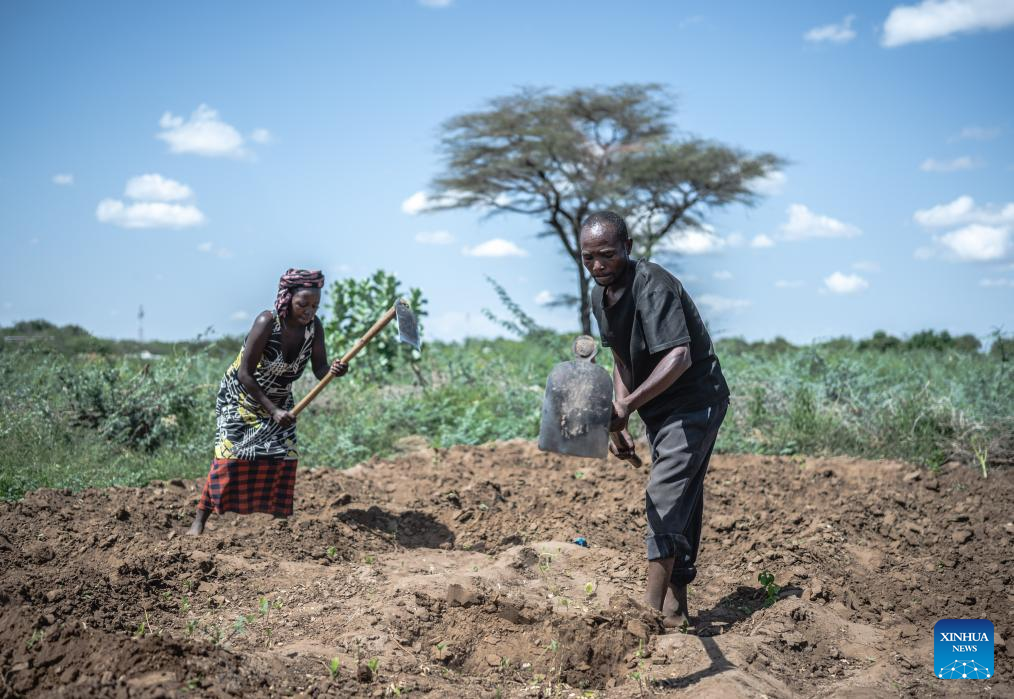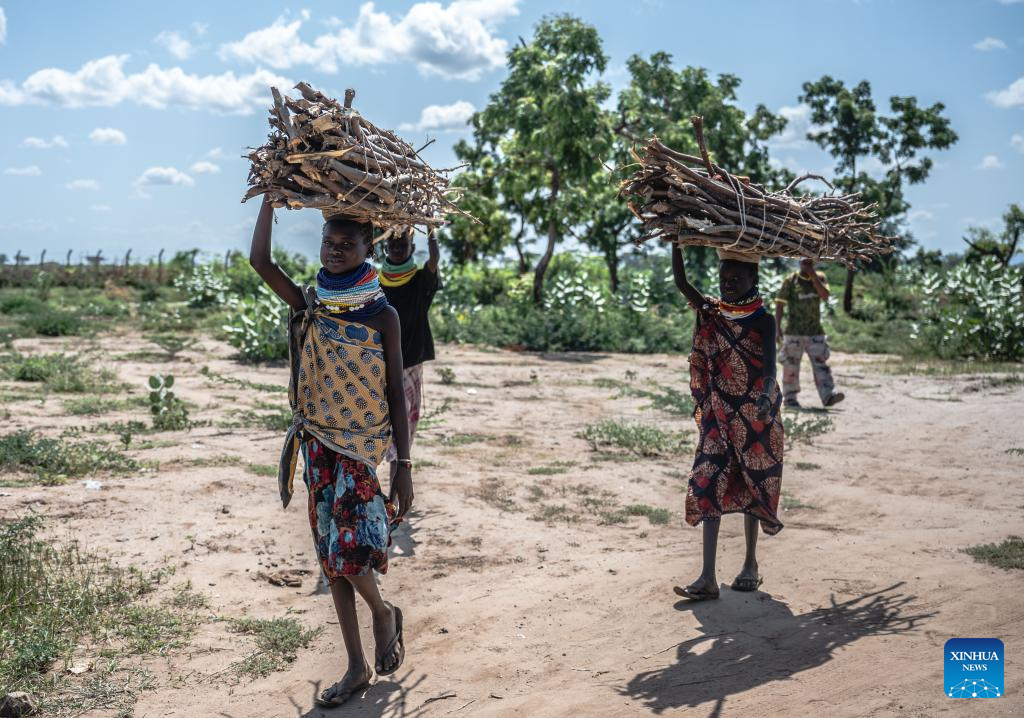
Farmers check the growth of peanut at the Choro Farm in Kakuma refugee camp in Turkana, Kenya, June 19, 2024.
Kakuma Refugee Camp is the country's second-largest camp, hosting about 288,000 refugees from nine countries, including South Sudan, Ethiopia, Burundi, and the Democratic Republic of the Congo (DRC).
Due to the impact of extreme weather throughout years, the agriculture and economy of the area remain underdeveloped.
To boost food security in Kakuma refugee camp and the Turkana tribe, and to promote the integration of refugees into the local community, the United Nations High Commissioner for Refugees (UNHCR) partnered with the Turkana County government to establish the Choro Farm within Kakuma refugee camp in 2017.
The farm covers an area of 25 acres and involves 120 farmers, including refugees and local community members, cultivating crops such as peanuts and spinach. Currently, the crop has benefited the surrounding communities. (Xinhua/Wang Guansen)
KAKUMA, Kenya, June 19 (Xinhua) -- Refugees based in Kakuma Refugee Camp in northwestern Kenya, host communities, and government officials on Wednesday staged a march organized by the United Nations High Commissioner for Refugees (UNHCR)-Kenya in support of solidarity amid the rising influx of refugees.
Nanduri Sateesh, head of the UNHCR-Kenya sub-office in Kakuma, said the three-km walk symbolized the unity that has prevailed between the host communities and the more than 20 refugee nationalities hosted in Kenya.
"We have demonstrated that standing together can create a welcoming and supportive environment for refugees, celebrating their strengths and contributions while acknowledging the challenges they face," Sateesh said, adding that the walk signifies that all the relevant stakeholders are committed to building a better, more inclusive world for all.
Kakuma Refugee Camp is the country's second-largest camp, hosting about 288,000 refugees from nine countries, including South Sudan, Ethiopia, Burundi, and the Democratic Republic of the Congo (DRC).
The UNHCR also hailed Kenya for its continued support and solidarity, which have been crucial in providing a haven for refugees since 1992.
Ajang Nyuop Bol, a community leader for refugees in Kakuma Refugee Camp, urged the government and development partners to carry forward the spirit of solidarity and strive for a world where refugees and host communities work together to overcome the hurdles they encounter on a daily basis.
The 39-year-old refugee from South Sudan added that displaced persons fleeing their homelands require support from local communities to fulfill their socioeconomic potential. ■

A farmer gets rid of weeds with a flock of sheep at the Choro Farm in Kakuma refugee camp in Turkana, Kenya, June 19, 2024.
Kakuma Refugee Camp is the country's second-largest camp, hosting about 288,000 refugees from nine countries, including South Sudan, Ethiopia, Burundi, and the Democratic Republic of the Congo (DRC).
Due to the impact of extreme weather throughout years, the agriculture and economy of the area remain underdeveloped.
To boost food security in Kakuma refugee camp and the Turkana tribe, and to promote the integration of refugees into the local community, the United Nations High Commissioner for Refugees (UNHCR) partnered with the Turkana County government to establish the Choro Farm within Kakuma refugee camp in 2017.
The farm covers an area of 25 acres and involves 120 farmers, including refugees and local community members, cultivating crops such as peanuts and spinach. Currently, the crop has benefited the surrounding communities. (Xinhua/Wang Guansen)

Farmers plow at the Choro Farm in Kakuma refugee camp in Turkana, Kenya, June 19, 2024.
Kakuma Refugee Camp is the country's second-largest camp, hosting about 288,000 refugees from nine countries, including South Sudan, Ethiopia, Burundi, and the Democratic Republic of the Congo (DRC).
Due to the impact of extreme weather throughout years, the agriculture and economy of the area remain underdeveloped.
To boost food security in Kakuma refugee camp and the Turkana tribe, and to promote the integration of refugees into the local community, the United Nations High Commissioner for Refugees (UNHCR) partnered with the Turkana County government to establish the Choro Farm within Kakuma refugee camp in 2017.
The farm covers an area of 25 acres and involves 120 farmers, including refugees and local community members, cultivating crops such as peanuts and spinach. Currently, the crop has benefited the surrounding communities. (Xinhua/Wang Guansen)

People deliver brushwood at the Choro Farm in Kakuma refugee camp in Turkana, Kenya, June 19, 2024.
Kakuma Refugee Camp is the country's second-largest camp, hosting about 288,000 refugees from nine countries, including South Sudan, Ethiopia, Burundi, and the Democratic Republic of the Congo (DRC).
Due to the impact of extreme weather throughout years, the agriculture and economy of the area remain underdeveloped.
To boost food security in Kakuma refugee camp and the Turkana tribe, and to promote the integration of refugees into the local community, the United Nations High Commissioner for Refugees (UNHCR) partnered with the Turkana County government to establish the Choro Farm within Kakuma refugee camp in 2017.
The farm covers an area of 25 acres and involves 120 farmers, including refugees and local community members, cultivating crops such as peanuts and spinach. Currently, the crop has benefited the surrounding communities. (Xinhua/Wang Guansen)



